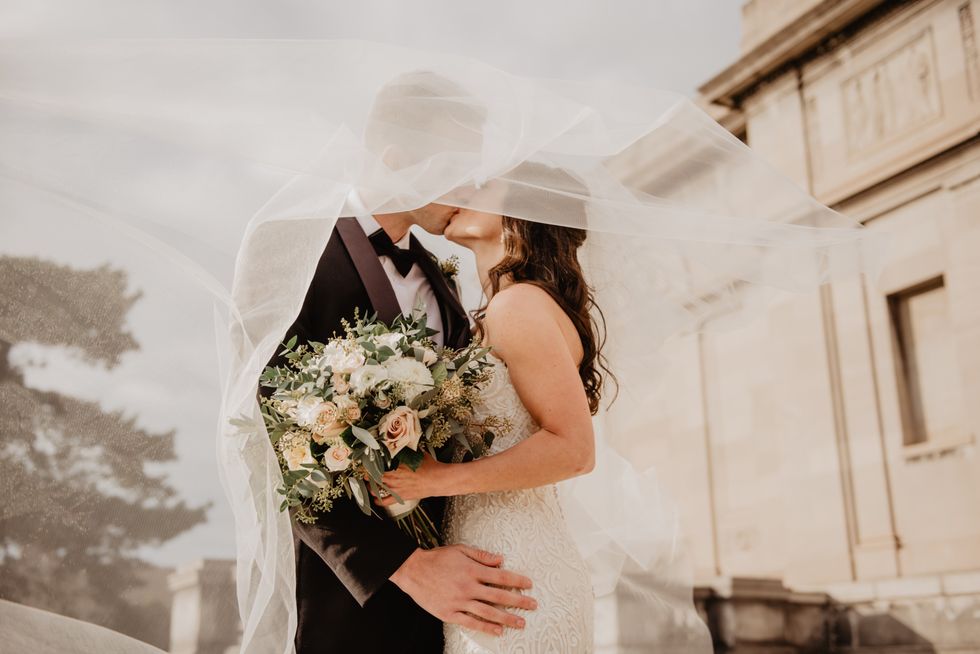
There's one question that's been lingering in the depths of my mind lately — is marriage actually on the decline? If I were to answer that based on the playlist I recently listened to...I'd probably say yes. But, I know my musical tastes don't represent all Millennials or Gen Z and their relationships.
Still, I can't help but notice a trend on social media where more people are seemingly shifting away from the traditional idea of marriage. As of 2023, 85% of Gen Z and Millennials feel like marriage isn't mandatory for a committed relationship. That contrasts my more religious upbringing where marriage was upheld in the church's eyes. The church taught a more traditional nuclear family was the way, and anything else would be living in sin.
Between religion and seeing examples of long-term marriages, I naturally spent time dreaming about my future wedding. But if you were to ask me what I thought about marriage conceptually? I wouldn't have been able to give a clear opinion. Now that I have more experience under my belt, I feel clearer about where I stand on it, though.
Still, to answer my burning question about if marriage is on the decline societally, I spoke with Licensed Professional Counselor Marissa Moore (MA, LPC), Licensed Therapist Diana Gaspersoni (LCSW-R), Professor Ryan Sultán (MD), and Officiant and Premarital Counselor Hope Mirlis about their perspectives. I also spoke with a few individuals regarding their relationship statuses and opinions about marriage to shed more light on the diverse outlook others may have about it all. Let's dive in!
Why We Choose To Marry

There are different reasons why people choose to get married. Moore, MA, LPC of Mentalyc believes marriage is a "deeply personal and culturally influenced decision" that's driven by various ideals or motivations. She said the following factors can lead to a better understanding of that decision:
- Love and companionship: Many people see marriage as opportunity to share their lives, joys ,and challenges with a partner who understands and supports them.
- Stability and security: Marriage often involves legal and financial benefits that can offer a safety net, especially when facing life's uncertainties together.
- Family and tradition: Many individuals marry to uphold family traditions, honor their cultural values and fulfill their parents' expectations.
- Desire for children: The desire to raise children in a stable and supportive environment can motivate couples to marry.
- Religious and spiritual beliefs: For those with strong religious beliefs, marriage is often seen as a sacred union under the eyes of a higher power.
Gaspersoni, LCSW-R of Be.WELL. agrees that some people are influenced by their family of origin. For others, she said "It's a milestone trajectory that people try to align their lives with. Also, there's the perceived safety net of marriage; the promise of commitment."
Not to mention, sometimes we get our expectations from movies so there's not always real conversations about how to make marriage work.

On the other hand, Professor Sultán, MD, an evolutionary informed relationship therapist at Columbia University, looks to biology to understand our drive to marry.
He said, "When we delve into the ideals about why we marry from an evolutionary perspective, it's deeply rooted in our biological drive to reproduce and ensure the survival of our genes." He also mentioned the historical benefits marriage provided those with children. "... marriage can be seen as a social institution that evolved to support the long-term commitments necessary for rearing human children, who required extended periods of care," Professor Sultán said.

Premarital Counselor Hope Mirlis of Perfect Union NY says she always makes sure to ask her clients why they want to get married. "Some of my clients' recent responses have ranged from 'This is the person I want to be with through the ups and downs' to 'It's an important part of my faith,'" Mirlis said. In her experience, some of her clients are Catholic and are interested in the Pre-Cana (a course pre-approved by the church) while others are influenced by the experiences of their friends or family members who received premarital counseling.
"[Couples] want to make sure they are on the same page as they enter marriage. They also want a stamp of approval from a professional who can view the relationship from the outside," Mirlis continued.
Why We Might Be Waiting Longer To Get Married

Today, the amount of people who are married in the U.S. has declined from 58% to 53% due to a number of changes. Moore's theories includes the following:
- Career and education: People are dedicating more time to their education and professional development before committing to a long-term relationship.
- Economic factors: The rising cost of living, student loan debt, and housing expenses can influence individuals to delay serious relationships until they feel financially secure.
- Changing social norms: There's less pressure to follow traditional timelines. Also, people are increasingly valuing personal growth and experiences before settling down with the rise of individualism.
- Communication and technology: Online dating and social media offer more opportunities to connect while also allowing people to take their time in finding compatible partners.
- Fear of divorce: People are taking more time to ensure they are making the right choice for a lasting partnership.
- Delayed milestones: Many people want to achieve personal and professional goals before fully committing to a relationship.
She believes it's important for individuals to look at their own values so they're able to "make decisions that align with their unique circumstances and aspirations."
Gasperoni echoed those sentiments and said, "Women's roles were different but now we have more options to do things like apply for a credit card or buy a home without being married. We can also decide to freeze our eggs while we pursue our careers."

When I asked Gasperoni whether she thinks women are able to balance a career, marriage, and motherhood, her response was that it's not impossible, but it can cause more anxiety and stress. "There's this idea you're supposed to do everything at the same time," she said.
Ironically, I came of age during the #girlboss movement and leaned into the idea that I could in fact balance everything. It wasn't until I became a first time mom, moved in with my partner, and began pursuing my career that I realized I might be in a psychological pickle. I went from trying to do it all to accepting the possibility that I'm okay with waiting to get married.
By choosing to prolong marriage, Gasperoni believes people are able to come into more autonomy and have more expectations of their partners. "More people are expecting their partners to not only be more present but to also be a companion instead of solely providing for the household." There's also the added bonus of knowing what your non-negotiables are instead of accepting things because it's merely expected.

Professor Sultán added, "... our evolved brains are now navigating a world vastly different from our ancestral environment, where the pressures of modern society, career aspirations, and a multitude of choices can delay the traditional timeline of commitment." These changes accompanied by individualism may be considered 'selfish' but I personally feel it's healthy to make decisions that aren't rooted in the opinions of society or those in our social circles.
Gasperoni's ultimate advice? "Make sure you choose what's right for you. There's still a sacrifice no matter what decision you choose. You have to be okay with what you decide."
Knowing that everyone has different views, I spoke to individuals with various relationship statuses to get their opinions about marriage. Some chose to remain anonymous, while others were okay sharing their names, age, and professions. Here are their responses:
Single And Interested In Marriage

Danielle Reed, 29
"I've been with my boyfriend now for 3 years. We bought a house together in 2021 and are planning to get married by 2025. We've discussed it openly and honestly, but he still felt pressured. Men seem to not want to put a timeline on it the same way that women do, but I'm glad we have open communication. Also he said that his ideas of marriage were heavily affected by his parents' own marriage and what he did and didn't see work for them."
Single And Uninterested In Marriage

Recent College Grad
"Personally, I'm not keen on getting married. I'm simply not comfortable with the economic, legal, and societal implications of marriage. I don't want someone else's last name and I don't want to share my finances with someone else. Also, relationships are never perfect. If something goes terribly wrong in a marriage, the thought of having to go through the law to get separated from someone makes me nervous.
I'm Indian so in my culture marriage is seen as a necessary part of life. The thought of someone choosing to stay unmarried is unfathomable in Indian culture. This is part of the reason why marriage makes me uncomfortable. I don't like being told that sharing my life with someone is something I have to do.
If I meet someone really special, someone who can truly change my mind -- then maybe. I have high standards for situationships, let alone a potential spouse. People think I'm cynical for thinking like this but in my opinion, having high standards for someone you want to spend the rest of your life with is a no-brainer."
In A Relationship, But Unmarried

Anonymous
"I've been in a long-term relationship for almost a decade and used to be head-over-heels in love with the idea of getting married. Now that I'm older and have more relationship experience, I haven't been in a rush to get to the altar. A big part of this is influenced by making sure I'm not entering marriage just because others feel it's the 'right' thing to do. Also, I'm fearful because of some negative/harmful things I learned about long-term marriages in my family. Marriages aren't perfect but it's made me fearful about having to endure a ton of heartbreak within my marriage just to reach a golden anniversary.
A decade is long time to be with someone but I want to make sure I'm fully committed to the institution of marriage before saying 'I do.'"
In A Long-Term Marriage

Diana Richey, Women's Investor
"I was 23 when I got married the first time. I didn't have an idea about marriage at first besides a deep traditional view (i.e, the man would provide financially and I'd take care of household). Unfortunately, I lost myself in that marriage and believed 'if he's okay then I'm okay' was enough. That was 10 years of pouring myself into my ex-husband so I'm a recovering co-dependent.
I realized I was the common denominator after getting divorced and dating the wrong guys. So, I did a bunch of inner work and looked at patterns as well as childhood stuff. Now my husband and I have a different philosophy in my current marriage. Our motto is that we'll 'fill up our own cups and share it.'
We also periodically ask each other 'what do you wanna say that you don't want to say' which is the act of opening ourselves up to give space for hard truths to be shared. We agree to stay at zero emotionally meaning we can't blow up in the other person's face or shrink/disengage when we hear something that makes us uncomfortable.
I've learned that we as people have to learn how to be in long-term committed relationships. Love is just the start. And, any hard cultural rules that are imposed on us makes it hard for us to find our own voice and authenticity."
While statistics show a slight decline in marriage, it doesn't mean people no longer value it. Instead, it appears some people are making decisions based on what works for their life as opposed to the expectation of upholding tradition. I like to think that's a healthier approach.
What are your current thoughts about marriage? Let us know in the comments and join the conversation on Facebook!
Header image via wendel moretti/Pexels
0 Commentaires